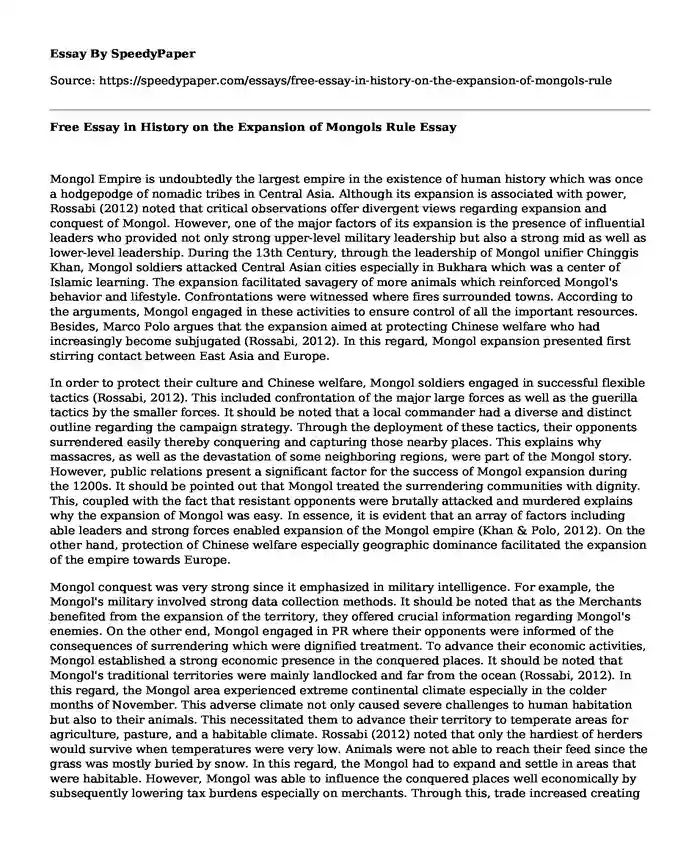Mongol Empire is undoubtedly the largest empire in the existence of human history which was once a hodgepodge of nomadic tribes in Central Asia. Although its expansion is associated with power, Rossabi (2012) noted that critical observations offer divergent views regarding expansion and conquest of Mongol. However, one of the major factors of its expansion is the presence of influential leaders who provided not only strong upper-level military leadership but also a strong mid as well as lower-level leadership. During the 13th Century, through the leadership of Mongol unifier Chinggis Khan, Mongol soldiers attacked Central Asian cities especially in Bukhara which was a center of Islamic learning. The expansion facilitated savagery of more animals which reinforced Mongol's behavior and lifestyle. Confrontations were witnessed where fires surrounded towns. According to the arguments, Mongol engaged in these activities to ensure control of all the important resources. Besides, Marco Polo argues that the expansion aimed at protecting Chinese welfare who had increasingly become subjugated (Rossabi, 2012). In this regard, Mongol expansion presented first stirring contact between East Asia and Europe.
In order to protect their culture and Chinese welfare, Mongol soldiers engaged in successful flexible tactics (Rossabi, 2012). This included confrontation of the major large forces as well as the guerilla tactics by the smaller forces. It should be noted that a local commander had a diverse and distinct outline regarding the campaign strategy. Through the deployment of these tactics, their opponents surrendered easily thereby conquering and capturing those nearby places. This explains why massacres, as well as the devastation of some neighboring regions, were part of the Mongol story. However, public relations present a significant factor for the success of Mongol expansion during the 1200s. It should be pointed out that Mongol treated the surrendering communities with dignity. This, coupled with the fact that resistant opponents were brutally attacked and murdered explains why the expansion of Mongol was easy. In essence, it is evident that an array of factors including able leaders and strong forces enabled expansion of the Mongol empire (Khan & Polo, 2012). On the other hand, protection of Chinese welfare especially geographic dominance facilitated the expansion of the empire towards Europe.
Mongol conquest was very strong since it emphasized in military intelligence. For example, the Mongol's military involved strong data collection methods. It should be noted that as the Merchants benefited from the expansion of the territory, they offered crucial information regarding Mongol's enemies. On the other end, Mongol engaged in PR where their opponents were informed of the consequences of surrendering which were dignified treatment. To advance their economic activities, Mongol established a strong economic presence in the conquered places. It should be noted that Mongol's traditional territories were mainly landlocked and far from the ocean (Rossabi, 2012). In this regard, the Mongol area experienced extreme continental climate especially in the colder months of November. This adverse climate not only caused severe challenges to human habitation but also to their animals. This necessitated them to advance their territory to temperate areas for agriculture, pasture, and a habitable climate. Rossabi (2012) noted that only the hardiest of herders would survive when temperatures were very low. Animals were not able to reach their feed since the grass was mostly buried by snow. In this regard, the Mongol had to expand and settle in areas that were habitable. However, Mongol was able to influence the conquered places well economically by subsequently lowering tax burdens especially on merchants. Through this, trade increased creating huge revenue streams.
References
Khan, K., & Polo, M. (2012). The Mongol Empire. Empires in East Asia, 335-338.
http://www.sps186.org/downloads/basic/727192/ch12_3.pdf
Rossabi, M. (2012). Mongols: A very short introduction. Oxford: Oxford University Press Inc. https://books.google.co.ke/books?id=gqviy7MRuIgC&printsec=frontcover&dq=The+mongols+a+very+short+introduction+by+morris+rossabi&hl=en&sa=X&ved=0ahUKEwiu-JS---3dAhVEIsAKHcTTA5QQ6AEIJzAA#v=onepage&q=The%20mongols%20a%20very%20short%20introduction%20by%20morris%20rossabi&f=false
Cite this page
Free Essay in History on the Expansion of Mongols Rule. (2022, Aug 18). Retrieved from https://speedypaper.com/essays/free-essay-in-history-on-the-expansion-of-mongols-rule
Request Removal
If you are the original author of this essay and no longer wish to have it published on the SpeedyPaper website, please click below to request its removal:
- Introduction of Pluripotent Stem Cells - a Summary Paper Example for Free
- Sex/Gender Identity - Article Review in a Free Essay Sample
- Microeconomics Essay Sample
- Literary Essay Example: Analysis of Thank You, Maam by Langston Hughes
- Marketing Essay Example about SM Scanning and Finding Markets for Their Service
- Free Paper with the Annotated Bibliography on Effects of Trade Barriers
- Essay Sample on School Marks in Indonesia
Popular categories





